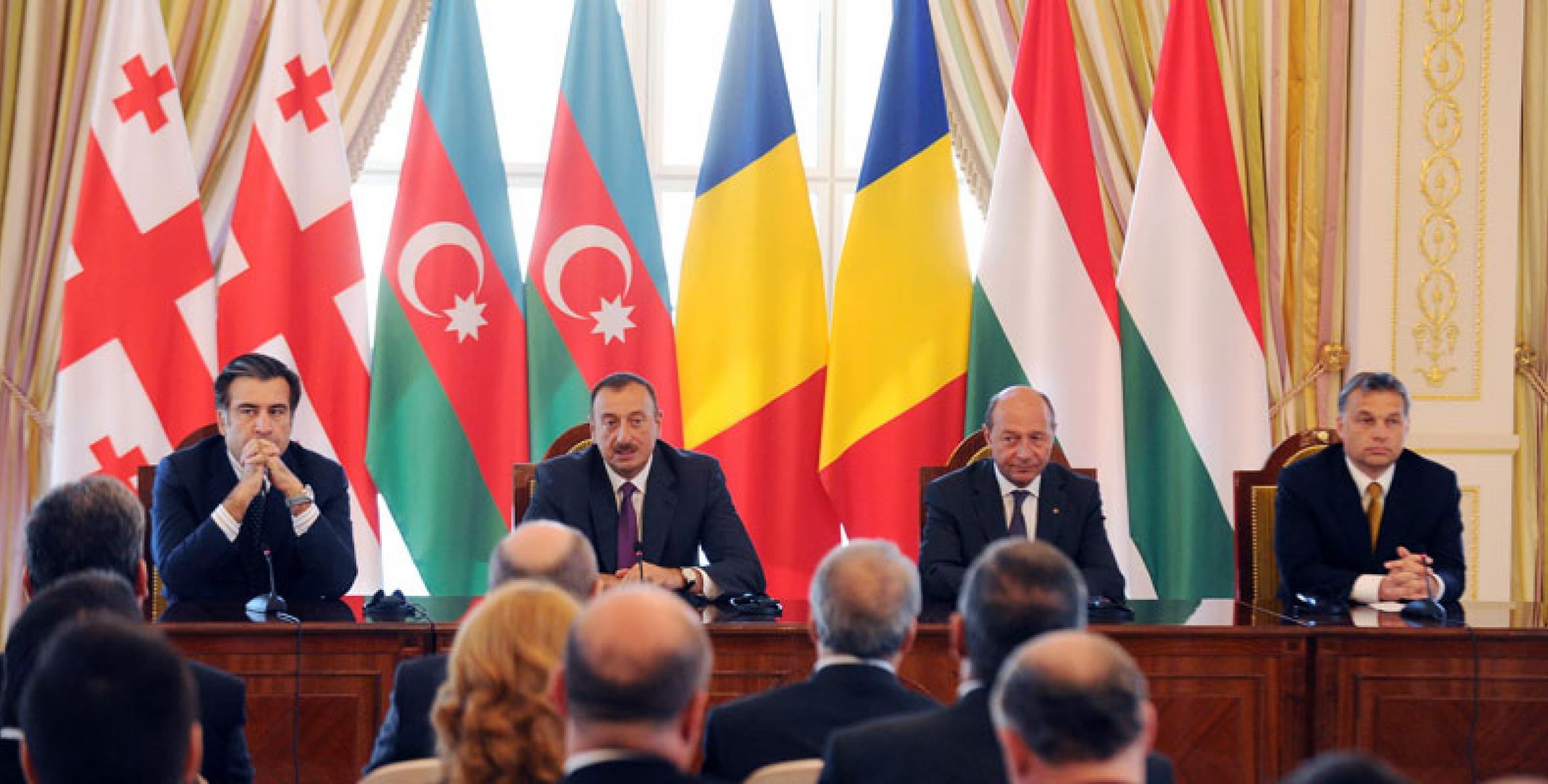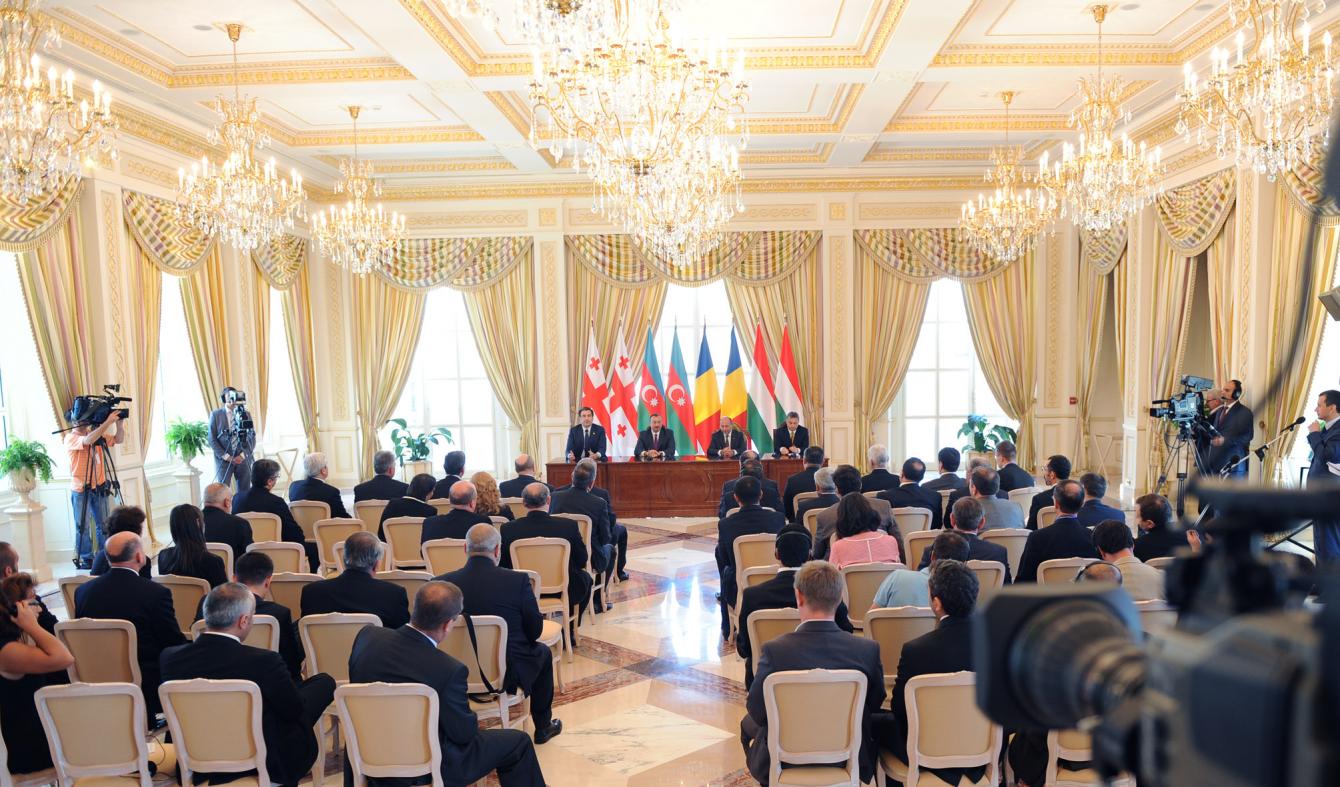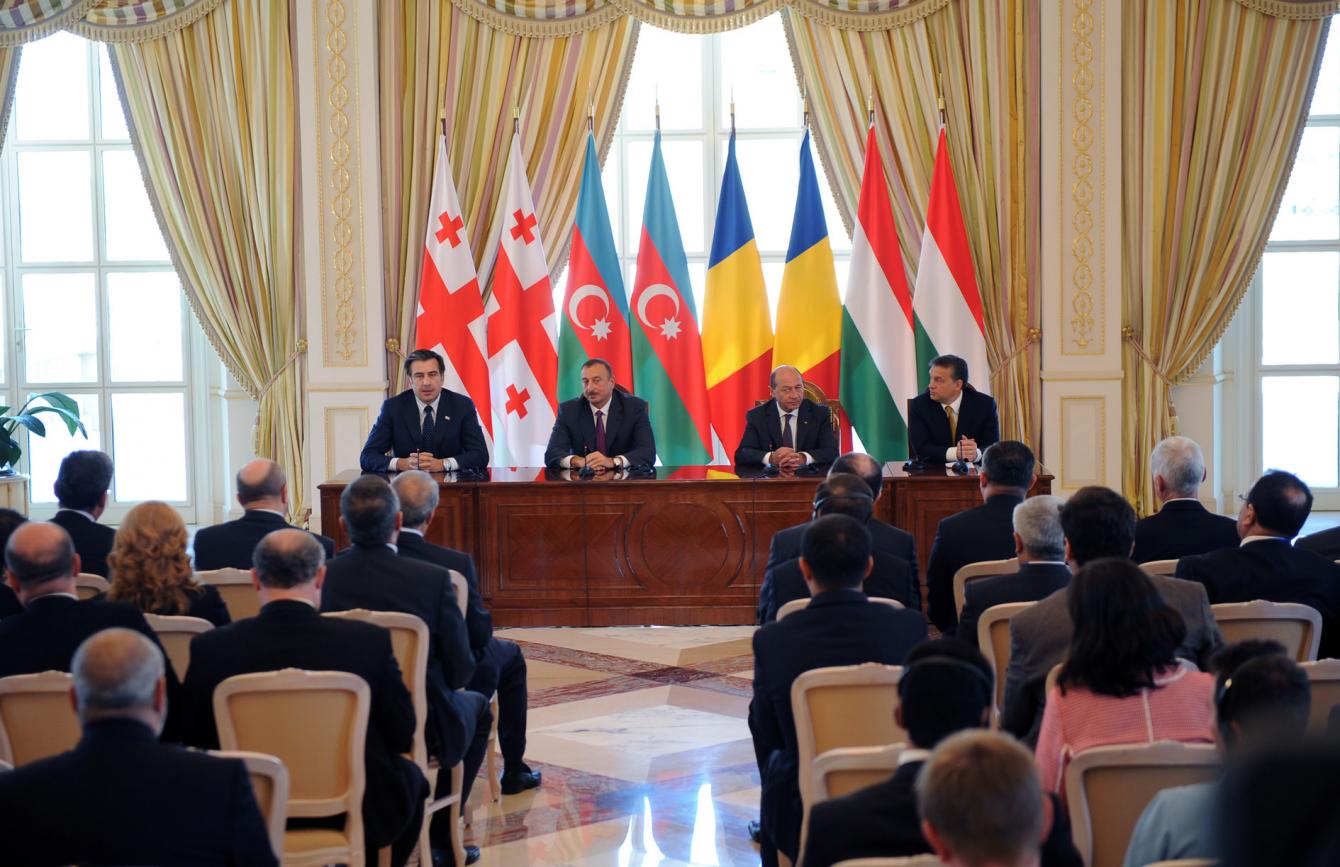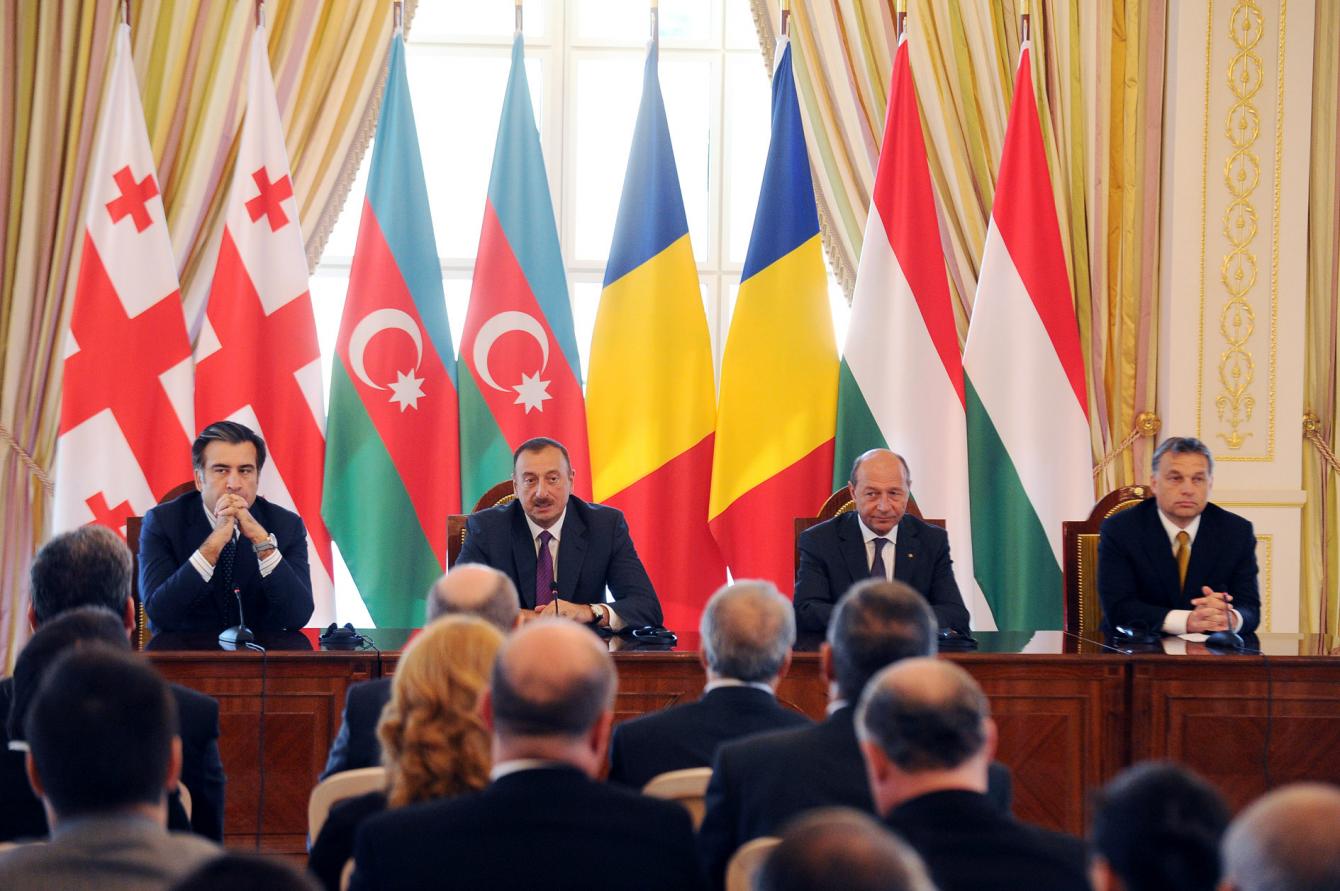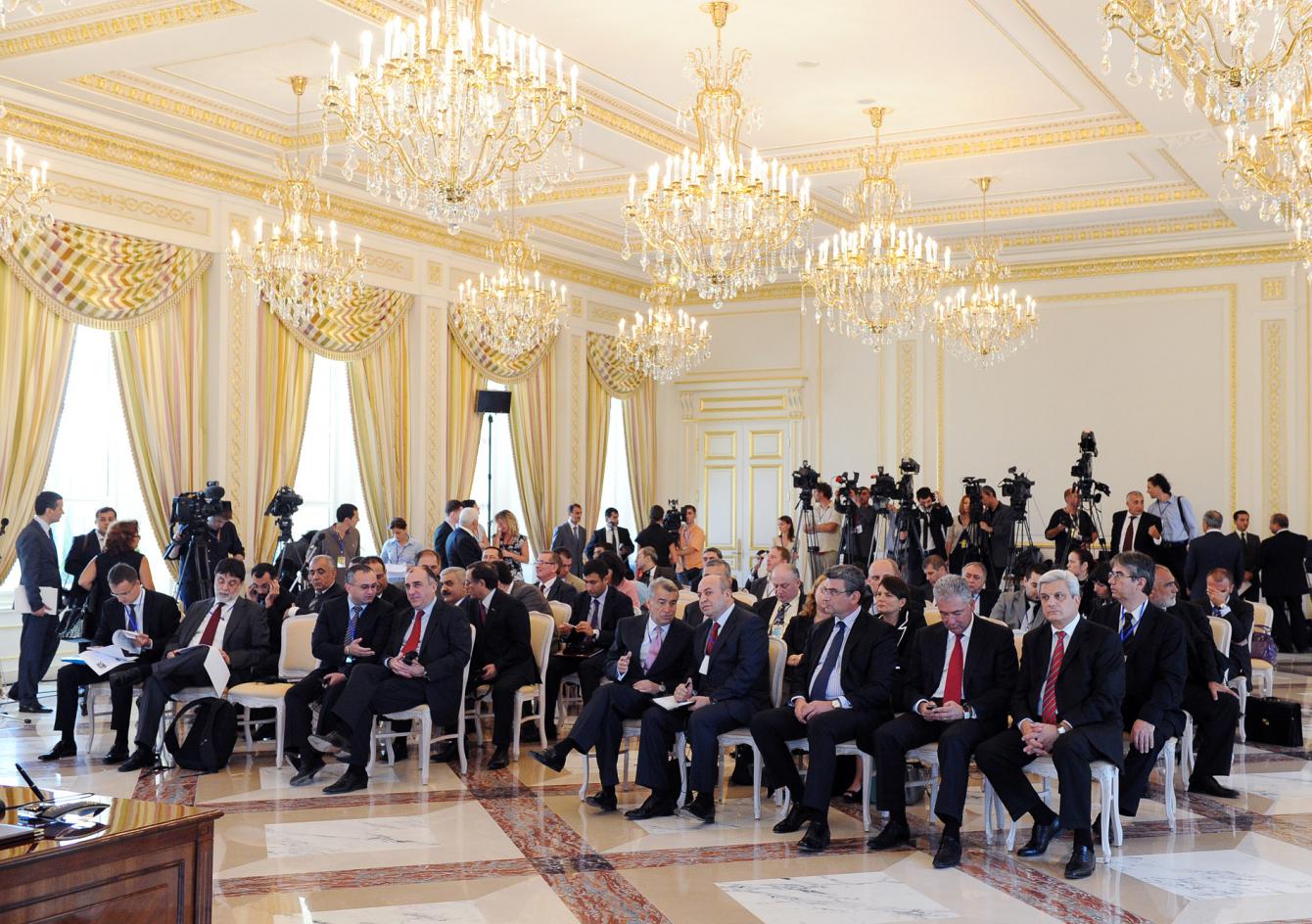After the signing of the Baku declaration on the AGRI project, Azerbaijani President Ilham Aliyev, Romanian President Traian Basescu, Georgian President Mikheil Saakashvili and Hungarian Prime Minister Viktor Orban held a joint press conference.
In his statement, President Ilham Aliyev said:
- Dear ladies and gentlemen!
I would like to congratulate all of you on this remarkable event. We have just signed an important declaration on the AGRI project. We worked on this project for a long time. Although this is a relatively new project, it has a great future. We discussed it today. The efforts made by the leaders of our countries, by our citizens, representatives of companies and ministries towards facilitating this meeting have already yielded good results. We are at the start of major development, and I am sure it will be successful.
We have everything necessary for successful progress of the project. Above all, we have a strong political will. There is close bilateral and multilateral cooperation between our countries. Today’s summit is a good indicator of that.
We have significant natural resources. Azerbaijan will contribute to increasing production from Shah Deniz and other gas fields. We have reliable transport and transit routes. We have consumer friends. They need additional sources of gas supply. If we connect all important elements in any potential energy project, we can see an impressive picture. I think a lot will depend on how fast and effectively we implement the declaration signed, how fast and effectively we prepare the feasibility study and, of course, on financial resources, experience and technical skills.
I am sure that our experience in promoting and implementing gigantic energy projects will bring us success. We have special experience. We have discussed issues of cooperation with international financial institutions today to attract investment into the oil and gas sector and increase financial resources, issues of pipelines under construction and fruitful cooperation between consumer, transit and producer countries. The balance and inter-dependence of these interests are important elements of successful realization of projects. In other words, we have everything necessary to implement the project. I do hope that this ceremony and talks, the instructions we have issued to companies and ministries will play a role in future successes.
I would like to congratulate you all on this important event. I am sure that this day will go down in history, strengthen our partnership and energy security, the measures we are working on, and lead to cooperation between our peoples and regions, prosperity and success. I would like to thank dear guests for being with us today, and all participants for their hard work. Thank you very much and now the floor is given to President Saakashvili.
in his statement, Georgian President Mikheil Saakashvili said:
- First of all, I would like to express my gratitude to the Azerbaijani side for this hospitality. I come to Baku quite often and every time I witness not only permanent development of this city, but also how fast it is pacing into the bright future. This is a very lively city indeed, there is always something going on here. Yesterday we had the opportunity of seeing the Icheri Sheher and new construction work underway in the city. You know, this policy is based on the idea that all of Azerbaijan’s revenues must be channeled into the well-being of its people. These results are being achieved in Azerbaijan. I think they are based on a sustainable and far-sighted policy. The beauty of Baku and the inspiration of President Ilham Aliyev, his views regarding a bright future for this country have impressed me profoundly.
I would like to repeat that what is taking place here today is history. By looking at the map you can see that this is the most logical route for energy supplies. It is straight and therefore the shortest. Covering a distance of thousands of kilometers from the Black Sea, this is the shortest route for the transportation of Caspian energy resources to Europe. The project wasn’t implemented before because third parties had not been identified. At the same time, we fully support the Nabucco pipeline which will run through Turkey. However, AGRI is certainly the most logical and shortest route.
President Traian Basescu was among those who saw the simplicity of this project, approved it and did the necessary work. Today we are pleased to see Hungarian Prime Minister Viktor Orban here. I think this is an important issue for his country and the Eastern Partnership program.
Next year Hungary will be presiding the EU. We are all playing a major role in establishing closer ties with the EU Eastern Partnership program and doing all the work in this direction. From this standpoint, I think we are witnessing novelties in Hungary proper, in its policies and government. They are conducting reforms. I would like to note that we are also a reformer-state, but I have to mention Hungary too. On the other hand, I think this will lead to new energy supplies as part of the Eastern Partnership policy.
We need new energy and a new impetus. Hungary’s participation in this project will give second wind to European energy projects and form a new approach. At the same time, we hope that Hungary and Romania will make effort to create a common EU policy in the energy sphere and long-term energy security in Europe. A few years ago my country was not safe in the energy issue. Thanks to our Azerbaijani friends and other partners in their efforts to ensure energy security and sustainable development of Georgia, today our country is one of the most stable and safest countries in the world. I think that this is a prime example of diversification, clear thought, a good partnership, transparency, accountability and reliability of this project.
If you pay attention to Azerbaijan, then you will witness the fact that in many projects this country never left anyone in a difficult situation. If you look at other energy exporters, you can see that this is an exceptional case. From this perspective, today we must be optimistic. This is not a common declaration, it is a reality, this will happen and be the fastest project to be implemented in the region. Thank you very much.
In his statement, Romanian President Traian Basescu said:
- First of all, let me congratulate my colleagues on the conclusion of the agreement. In the Declaration, we stated our readiness to implement this project. I believe that the project, first of all, is proof of the correct approach to the EU Eastern Partnership. It shows that countries located on the eastern borders of the EU can cooperate in the interests of both parties. At the same time, the project complies with the EU strategy to create alternative open markets. It is also perhaps the most important project linking two shores of the Black Sea.
I have long supported the opinion in the European Union and other international organizations that the security of the European Union and even NATO is very dependent on developments in the Caspian Sea region and Central Asia. This project will contribute to cooperation between the EU and the Caspian Sea and Central Asia. I am sure that Azerbaijan is the first guarantor of the project. However, Azerbaijan is not the only guarantor. In addition, the project will contribute to energy security, including energy security of the eastern part of the European Union.
We know what happened two years ago. Gas supplies via Ukraine were then called into question. During that period, Romania had enough gas, and from this perspective could provide countries such as Bulgaria. However, due to a lack of infrastructure, Romania could not help this country. Currently, the EU has funded the establishment of the necessary infrastructure to transport gas between Romania and Hungary, Romania and Bulgaria. We believe that Hungary's participation in this project makes it competitive and effective within the EU.
This is the only project not based on political decisions and on rationality. Of course, those who can count the costs associated with joining this project can easily see that this is the best economic decision. The infrastructure in the first stage of the project will be established in Romania, Hungary, Austria and other countries. To implement the project in our country it is enough to invest in the establishment of two terminals for liquefied natural gas - one in Georgia, the other in Romania, and to expand by 100 kilometers the terminal in Georgia. This indicates that the project will not cost a lot, will be effective and may develop gradually. To obtain qualitative results we will be supporting the AGRI project from now onwards. Of course, we do not oppose the Nabucco project. We support that project too. However, Romania will support the AGRI project more because it can become a reality in the near future. After two or three years it will become a reality. Thank you!
In his statement, Hungarian Prime Minister Viktor Orban said:
- Thank you. By joining those who spoke before me, I would like to thank the hosts for the invitation to the legendary city of Baku. This is my first visit to your capital. The majesty of the city confirms that we made a big mistake by not coming here earlier. I hope that Hungary will promote long-term cooperation between this country and the European Union.
Mr. President, if I may, I would like to address three questions. We already have experience of cooperation and alliances based on the philosophy of the winners and losers. So now is the right time for cooperation, as this situation suits all parties. This cooperation will bring success to all. And we are pleased that this cooperation will be beneficial to all. This is good news for future decades of world politics.
The second question I would like to note is associated with diversification, which is important for every Hungarian. If we do not diversify routes and sources, there won’t be any competition in the energy. And without it we will politicize this business. The combination of energy and politics creates many problems for us. Therefore, diversification is a way out of this situation and a factor ensuring competition. This investment and collaboration is an excellent example of diversification of routes and sources.
In conclusion, I would say that, as noted by their Excellencies, we, Hungarians, represent the western part of this cooperation. We know what it means. We approach this project seriously, and in cooperation with Romania will do everything to demonstrate that the project is viable for the entire European Union. In this way we will provide a stable framework of the project. Your Excellency, let me express my appreciation to you for the invitation. I am very pleased to be here and thank you on behalf of the Hungarian people. Thank you.
Х Х Х
Then the heads of state answered questions from journalists.
Х Х Х
- I have a question for President Traian Basescu. I would like to ask whether European funds can be used for this project? How will this affect Nabucco? At the same time, I want to say that the Azerbaijani side has also expressed a desire to participate in the Nabucco project. Now I would like to know your opinion on this new project.
Traian Basescu: Let's start with the last part of your question. Romania is currently working on the feasibility study, which is funded by the U.S. government through its Development and Trade Agency, and here we are talking about building a gas terminal in Constanta. In other words, American partners want more extensive studies to be carried out and contributed to by Georgia. There are opportunities for that. Therefore, we first want to say that it can be financed and work on the feasibility study can be done on time. As for the price, I cannot say anything about that. I can say only one thing: if the project is implemented, it will be financed by the Trade and Development Agency and implemented in stages. 10 billion cubic meters of gas a year will be transported through the Constanta terminal, an additional 10 billion next year and another 10 billion cubic meters of gas in the third year. In general, this amounts to 30 billion cubic meters. This project, first of all, will depend on market demand and, on the other hand, on sources of supplies. We can note with confidence that the first phase of the project will be implemented thanks to the Azerbaijani gas. European funding will be attracted, so that after completion of the feasibility study we can talk seriously about financial sources of investments. Currently, we are taking upon ourselves this obligation, this responsibility, i.e. we as states are ready for various phases of the project. Later, at the next stage, we will determine who will invest, which companies will operate the terminals.
These terminals will be owned by private companies so that we can attract private capital. We want this work to begin. The role of national companies, the companies of four countries, will be in the fact that they will have a common office in Bucharest from which they can promote the project. I cannot say how much money will be spent on the project. You know that this will be the most inexpensive project that will require the least resources. Among the existing alternative routes this is the easiest way to transport energy from the Caspian Sea and Central Asia to European markets. As for the price, it will be a highly competitive project.
- Your Excellencies, Mr. Prime Minister, thank you very much. I would like to ask you again about the importance of this project in terms of diversification and alternative supply routes. Can we assume that this is a guarantee of energy security for all?
Viktor Orban: In fact, the issue is broader than it seems at first glance. First of all, there are many difficulties in the global economy, and there will be in the future. Therefore, we cannot say what Europe will be like in, for example, ten years. Without a doubt, there are many uncertainties in Europe and the global economy. The main question is how politicians and people respond to these uncertainties. There may be two possible options. The first is to take no action and wait until the end of the global financial crisis. Another option is to be active and to fight the global recession, identify new prospects. I believe that this project is crucial because it is a good response to the lingering global crisis. At the same time it is a good message to Europeans. You know that it is very important, it is very important to ensure a balanced budget, but we should not be limited to that. Therefore, we must continue to work. If there is no movement, there is no business. If there is no business, there will be no economic development. And if there is no economic development, people remain unemployed. Indeed, people are without work. In the European experience there may be political instability. If we want to live in peace and stability in Europe, then we need to be active against uncertainty. Therein lies the political significance of this project. Therefore I am very glad that I am a member of an active group. Who does not have any doubts? Don’t expect the difficult situations to be resolved by themselves, try to create the future yourself. That is what inspires me. From this perspective, our alliance will contribute to the stabilization of the European economy in the next decade.
Ilham Aliyev: I would like to add that diversification is an important element of energy security because countries like Azerbaijan, which have no direct access to global oil and gas markets - I mean large markets - are constantly faced with situations where there is a need for diversified supplies. And when a diversified infrastructure is available, our ability to conduct an independent energy policy rapidly increases. I can say that Azerbaijan did not have a diversified energy transportation infrastructure before. We had a few oil and gas pipelines built during the Soviet time and they did not operate. In the years of independence, investment was channeled into both extraction and the transport infrastructure. That is how the Baku-Supsa, the Baku-Tbilisi-Ceyhan oil and the Baku-Tbilisi-Erzurum gas pipelines were built. Today, Azerbaijan, which has large oil and gas resources, as well as large volumes of production, has seven pipelines transporting oil and gas in all directions. There are good opportunities, including technical, to expand these pipelines. If there is a need for increasing the volume of transportation of our natural gas and the gas from neighboring countries, then we can build more pipelines. For us, diversification means the ability to realize our energy potential. We are quite aware that diversification means the possibility of forecasting for countries unable to supply themselves with energy. It means their energy security.
As you know, energy security is an integral part of national security today. In this sense, the value of today's event and the declaration, of the summit we are holding is in the unity of our efforts. We are all interested in this project. We will make a contribution to the project by our political efforts, financial resources and, of course, possibilities of financial markets. This will provide diversification for producer, consumer and transit countries.
- There are several approaches to the transportation of gas from the Caucasus to Central Europe. How do you assess the chances for implementing this particular project, considering that Azerbaijan and Russia have already signed an agreement for the sale of gas? If possible, could you specify the volumes of gas resources in the country, and how much gas can the AGRI gas project count on?
Ilham Aliyev: Today we discussed these issues. The figures are known. This year, the volume of gas production in Azerbaijan will be 28 billion cubic meters. I can say that the domestic demand is about 10-11 billion cubic meters. The remainder is either exported or re-injected to increase oil production and keep it in stock. Today, natural gas production is limited to our export capacities. We are now exporting less gas than they could. So we are looking for new markets and new directions.
Today we export gas not only to Russia but also to other neighboring countries. For example, we have been exporting gas to Turkey. This year exports will exceed 6 billion cubic meters. We can easily increase gas exports by several billion cubic meters. We have been exporting gas to Georgia - more than 1 billion cubic meters. This is Georgia’s need today. I am confident that this figure will increase, as Georgia's economy is growing rapidly, and we are ready to increase exports. We also export gas to Iran. The available capacities and pipelines can provide additional gas supplies.
Last year we signed a contract with Russia, and since the beginning of this year we have been transporting half a billion cubic meters of gas there. But, given Russia’s growing need for gas supplies to its southern region from such a close country as Azerbaijan, and our increasing gas production, we decided to increase gas exports to Russia. This year, exports will be increased to 1 billion cubic meters. We agreed to bring this figure to 2 billion cubic meters next year.
In case of additional demand, we can increase the volume.
I think that the current level of production and export of gas will not interfere with our participation in other projects. We attach great importance to projects relating to the Southern Corridor. We perceive the Southern Corridor as one direction, although there are several projects within the Southern Corridor. The best-known of them, perhaps, is the Nabucco project, as there have been many meetings, summits, negotiations related to it. I can say that last year Azerbaijan took part in a summit on energy security, and we signed a declaration on Nabucco. Another project is Turkey-Greece-Italy, a third one is Trans-Adriatic project, another is AGRI. All these projects are part of the Southern Corridor, and we support them.
I think that all these projects have the potential. We must begin this work. When we started the construction of the Baku-Tbilisi-Ceyhan oil pipeline with the expectation of pumping 1 million barrels, the volume of our production was less than 200 thousand barrels. We invested in the pipeline the capacity of which was five times higher than production potential at the time. Four years after completion of the Baku-Tbilisi-Ceyhan oil pipeline, this pipeline, we can say, operates at full capacity. I am sure that AGRI and other projects will be implemented. We will stay in the European market as a reliable and long-term supplier of gas.
- My question to the President of Azerbaijan. Mr. President, what can you generally say about Azerbaijan's role in European energy security?
Ilham Aliyev: Today we discussed this issue in detail. We have been working on this for many years. As I noted earlier, energy security is a multilateral issue, which must provide for general security. For us the energy security of Europe means the possibility to invest more in new industries and increase production. I said in my speech at the summit Azerbaijan’s confirmed gas reserves constitute 2 trillion cubic meters, but in reality this figure is 5 trillion cubic meters. Therefore, to increase production we need more reliable and major markets.
Today we are in anticipation of major investments in gas fields in Azerbaijan. According to some estimates, we are talking about $20 billion. I can say that over the past 16 years, the total amount of investments in the oil and gas sector of Azerbaijan made up $46 billion. This is a fairly large number. However, only $20 billion will be invested in Shah Deniz alone, and it will allow us to extract an additional 16 billion cubic meters of gas, or approximately 40 billion cubic meters. To invest these funds, we need new markets, because in the gas business it is necessary to have a market first and then to invest. For us, the energy security of Europe in terms of alternative and additional supply routes is no less important than for Europeans. As Prime Minister Orban indicated, this situation suits everyone. We are working hard in this area, and will do all the work planned with great responsibility and commitment.
Thank you very much!

